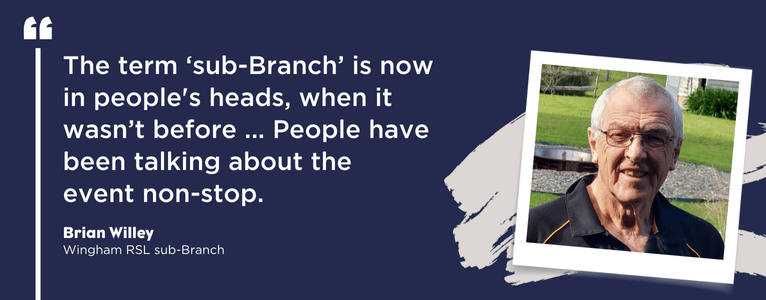6 steps to build a successful sport and recreation activity for veterans and families

How did the Wingham RSL sub-Branch organise a nutbush event for veterans, families and the community as part of Veterans’ Health Week?
By Lachlan Haycock
At a glance:
- The RSL NSW Sport & Recreation Program is driving positive change and fostering physical and mental wellbeing among veterans and their families
- Learnings from the Wingham Community Nutbush Dance, held as part of Veterans’ Health Week, can help sub-Branches to host successful wellbeing activities at any time of year
- “People have been talking about the event non-stop,” says Wingham RSL sub-Branch President, Brian Willey.
The RSL NSW Sport & Recreation Program, the largest of its kind in Australia, is driving positive change and fostering physical and mental wellbeing among veterans, families and the wider community.
The program’s ethos is echoed by Veterans’ Health Week, organised each October by the Department of Veterans’ Affairs (DVA). This year’s theme of “Keep connected” has been evident in the inclusive, community-focused events for veterans and families organised by RSL sub-Branches across NSW.
The Wingham Community Nutbush Dance, held on the first day of Veterans’ Health Week, is the latest in a line of Sport & Recreation Program events hosted by the Wingham RSL sub-Branch.
Hosting inclusive wellbeing activities is possible any time of year. Here are six steps to organise a successful sport or recreational activity for veterans, families and the community.
1. Be ambitious
Don’t be afraid to try something different. Although tried-and-true activities – think lawn bowls, morning tea catch-ups, or a day on the golfing range – are effective and often attract a high level of involvement from the community, sometimes a novel idea will be matched by greater interest.
“The sub-Branch has been involved in the Sport & Recreation Program from the beginning,” says Wingham RSL sub-Branch President Brian Willey. “We’re always looking for new ideas to engage both members and veterans who aren’t yet members.
“A nutbush event had been floating around in my head for a while, and Veterans’ Health Week was the right opportunity for it to happen. We started planning it in June, because I wanted the whole community to take part, not only the sub-Branch.”
2. Open the doors wide
Willey says almost 400 people took part in the nutbush event at Wingham Central Park. The tremendous turnout was thanks to extensive outreach in the months prior to the event.
“We made posters,” he explains. “We spoke through the local Chamber of Commerce. We contacted every community organisation, from schools to sports clubs, fishing clubs to knitting groups. Anyone we could think of.
“An Affiliate member of the sub-Branch is very capable in social media. She knows how to use Facebook and volunteered to get the message out that way. She’s been a real dynamo that was very effective.”

3. Use your network
Wingham is a small rural town; there are only about 5,000 people in the town and 5,000 in the surrounding areas, says Willey. This meant it was critical for the sub-Branch committee to engage all possible connections to spread the word.
“One of our newer members is also vice-president of the Taree Lions Club,” he says. “He volunteered to provide a stage, and the club also donated $1,000 towards the costs of the event.”
The team spirit was evident across the board. “I’m also in the local fire brigade. I got a small team of colleagues to help with security – making the area safe with all the power leads and cables.”
If you’re an RSL NSW member, consider how your sub-Branch can join forces with others to achieve success.
4. Seek funding
For sub-Branches that need financial support to deliver activities, funding is available through the RSL NSW Sport & Recreation Program – get in touch with your committee to discuss.
Take the Laurieton RSL sub-Branch, which this week hosted a Gone Fishing Day along the inlet, as part of the Sport & Recreation Program. The sub-Branch also received financial support from the NSW Department of Primary Industry, helping organisers to invite more people and provide a better experience for attendees.
Each year, funding is also available from the DVA for organisations participating in Veterans’ Health Week. Keep an eye on the DVA website for more information.
5. Work with local media
Willey says the sub-Branch worked with ANZAC House to reach out to local media outlets. He credits the event’s success to the hard work of members who turned up to training sessions and spoke with media, such as the Manning River Times.
This has also helped to raise the profile of the sub-Branch as a supportive and family-friendly veterans-first organisation, and as an entity distinct from the RSL Club, according to Willey.
“The term ‘sub-Branch’ is now in people’s heads, when it wasn’t before.”
6. Make it fun
Making the event fun and interactive is a sure-fire way of making it memorable.
“A couple in their 80s dressed up and took part, even though they couldn’t dance for very long,” says Willey. “The kids got involved too. People have been talking about the event non-stop.”
RSL NSW welcomes veterans of any service length and background to join the organisation. Access support services and become part of a like-minded community of peers by becoming a member of RSL NSW.







